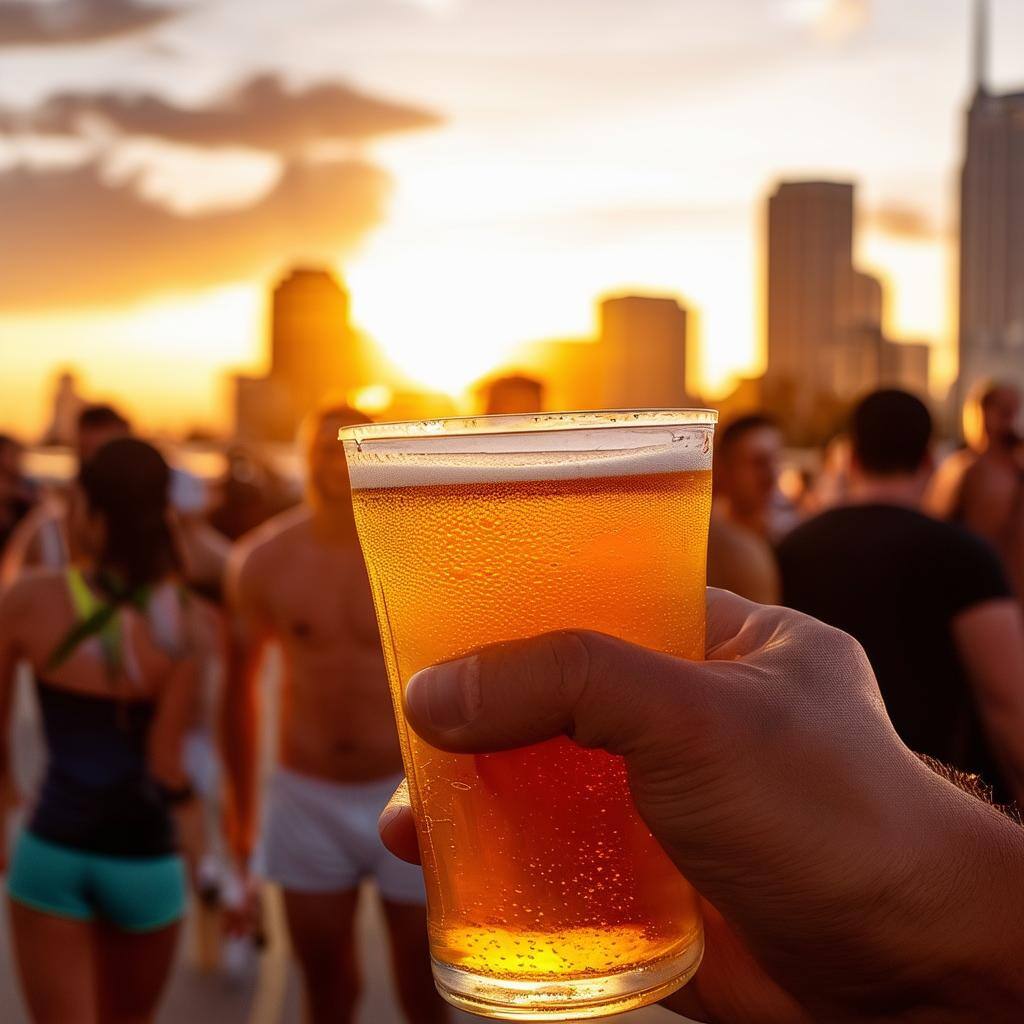
- October 8 2024
- Hunter Stark
Can Beer Aid in Post-Exercise Recovery? Exploring the Benefits
For many people, a cold beer after a workout or a long day of physical activity is a well-earned reward. But is there any science behind the idea that beer can have positive effects on recovery after exercise?
While excessive alcohol consumption is known to negatively affect performance and recovery, moderate beer consumption may offer some surprising benefits when it comes to post-exercise recovery.
Let’s take a closer look at how beer, when enjoyed responsibly, might actually help after a workout.
Hydration and Electrolyte Replenishment
Beer is primarily made of water, which means that in moderate amounts, it can contribute to rehydrating the body after exercise. Some beers, particularly lighter varieties with lower alcohol content, may help replenish lost fluids, especially when combined with water and electrolyte-rich drinks.
Additionally, beer contains small amounts of electrolytes like sodium and potassium, which are essential for maintaining fluid balance, preventing cramps, and supporting muscle function. After intense exercise, replenishing these electrolytes is crucial for avoiding dehydration and aiding in muscle recovery.
Tip: Opt for low-alcohol or alcohol-free beers, as they provide the hydration benefits without the dehydrating effects of higher-alcohol content beverages.
Beer’s Carbohydrate Content and Glycogen Replenishment
After a workout, your body needs to replenish its glycogen stores, which are depleted during physical activity. Beer, especially certain types like craft or wheat beers, contains carbohydrates, which can help restore glycogen levels in your muscles. This can be particularly beneficial after endurance activities like running, cycling, or swimming, where your body burns through its glycogen reserves.
In fact, one study found that moderate beer consumption after exercise was as effective as a carbohydrate drink in replenishing glycogen levels, provided the alcohol content was low. This means that in moderation, beer could act as a post-exercise carbohydrate source to kick-start recovery.
Antioxidants in Beer: Supporting Recovery
Beer, particularly darker varieties like stouts and ales, contains antioxidants derived from hops and barley. These antioxidants, including polyphenols, can help reduce inflammation in the body, which is a common result of intense exercise. Inflammation is a natural part of muscle repair, but too much inflammation can slow down recovery and lead to soreness.
The antioxidants in beer can potentially help modulate this inflammatory response, reducing muscle damage and supporting faster recovery. By lowering oxidative stress, these compounds may also support the immune system, which can be temporarily weakened after strenuous exercise.
Tip: Darker beers tend to have higher levels of antioxidants, so if you’re looking for potential anti-inflammatory benefits, you may want to consider a stout or porter over a lighter beer.
Social and Psychological Benefits
Beyond the physiological effects, beer can also have psychological and social benefits that contribute to recovery. Sharing a beer with friends after a tough workout or game can create a sense of camaraderie, promote relaxation, and reduce stress. Stress relief and mental recovery are just as important as physical recovery after exercise, and enjoying a beer in a social setting can help foster a balanced, positive outlook on fitness.
The post-exercise period is also a time to relax, unwind, and let your body recover. In moderation, beer can help you enjoy this downtime and reduce post-workout anxiety, making the recovery process more enjoyable and effective.
Beer and Cardiovascular Health
Some research suggests that moderate beer consumption can have positive effects on cardiovascular health. Beer, like red wine, contains certain compounds that can help improve circulation, increase "good" HDL cholesterol, and promote heart health when consumed in moderation. Improved circulation means that oxygen and nutrients can reach your muscles more efficiently, supporting the recovery process.
Cardiovascular fitness is an important component of overall exercise performance, and keeping your heart healthy can lead to improved endurance and faster recovery times.
Tip: The key to these benefits is moderation. For men, this typically means one to two beers a day, while women should aim for no more than one beer per day.
Beer Can Be a Relaxation Tool
A key component of recovery is rest and relaxation. After a workout, your body needs time to repair muscle tissue and restore energy levels. A beer after exercise can help you unwind and signal to your body that it’s time to recover. The act of relaxing with a drink may help reduce cortisol levels—your body's primary stress hormone—which can rise during intense exercise. Lower cortisol levels can support better muscle recovery and immune function.
However, it’s important to ensure that beer is part of a larger recovery plan that includes proper hydration, nutrition, and sleep.
The Takeaway:
Beer in Moderation Can Have Positive Effects on Recovery
While excessive alcohol consumption can have detrimental effects on exercise performance and recovery, enjoying beer in moderation after a workout may offer some benefits. From hydration and carbohydrate replenishment to antioxidants and social relaxation, beer can be a tool to enhance your post-exercise recovery—when used responsibly.
If you decide to enjoy a beer after your next workout, remember these key points:
- Moderation is key: Stick to low-alcohol or alcohol-free beers for the best hydration benefits.
- Hydrate properly: Always rehydrate with water or an electrolyte-rich drink first.
- Balance your recovery: Use beer as a complement to a well-rounded recovery strategy that includes stretching, nutrition, and rest.
So, can beer help with recovery? The answer is yes, but only if consumed responsibly and as part of an overall healthy lifestyle.
Cheers to that!
-1.png?width=129&height=50&name=Untitled%20design%20(24)-1.png)
Leave Your Comment
Many desktop publish packages web page editors now use model text
search for sites their infancy.